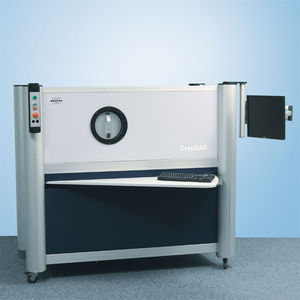
- Metrology - Laboratory
- Analytical Instrumentation
- Gas analyzer
- Bruker Optics GmbH & Co. KG
- Company
- Products
- Catalogs
- News & Trends
- Exhibitions
Gas analyzer TG-FTIRtemperaturebenchtopFT-IR

Add to favorites
Compare this product
Characteristics
- Measured entity
- gas
- Measured value
- temperature
- Configuration
- benchtop
- Technology
- FT-IR, thermogravimetric
Description
Thermogravimetric analysis (TG) follows changes in mass of the sample as a function of temperature and/or time. TG gives characteristic information about the composition of the measured sample, the amounts of the various components and their thermal behavior. In addition, further measurements are possible such as kinetic analysis of thermal decomposition.
The identification of gases released directly from the sample or during thermal treatment cannot be performed just by thermal analysis but coupling a spectroscopic method such as Fourier-Transform-Infrared (FTIR) spectroscopy is an excellent solution. IR spectroscopy is a classical technique, which depends upon the interaction of infrared radiation with the vibrating dipole moments of molecules. It gives, except for homonuclear diatomics and noble gases, a characteristic spectrum for each substance.
This combination yields a powerful analytical technique that combines the quantitative capabilities of TG and the qualitative capabilities of FTIR spectroscopy.
TG-FTIR is useful for a wide range of applications, including:
• Outgasing of Materials
• Detection of Residues
• Analysis of Additives
• Analysis of Aging Processes
• Competitive Analysis
• Characterization of Natural and Raw Materials
• Desorption Behaviour
• Analysis of Synthesis Processes
• Analysis of Decomposition Processes
Catalogs
No catalogs are available for this product.
See all of Bruker Optics GmbH & Co. KG‘s catalogsOther Bruker Optics GmbH & Co. KG products
FTIR Research Spectrometers
Related Searches
- Bruker gas analyzer
- Concentration analyser
- Monitoring analyser
- Desktop analyzer
- Automated analyzer
- Bruker spectrometer
- Gas detector
- Process analyser
- Continuous analyser
- Real-time analyser
- Compact analyser
- Laboratory analyser
- NDIR analyzer
- Digital analyser
- In-line analyser
- Temperature analyser
- Bruker laboratory spectrometer
- Frequency response analyzer
- Trace analyser
- Quality control analyser
*Prices are pre-tax. They exclude delivery charges and customs duties and do not include additional charges for installation or activation options. Prices are indicative only and may vary by country, with changes to the cost of raw materials and exchange rates.









